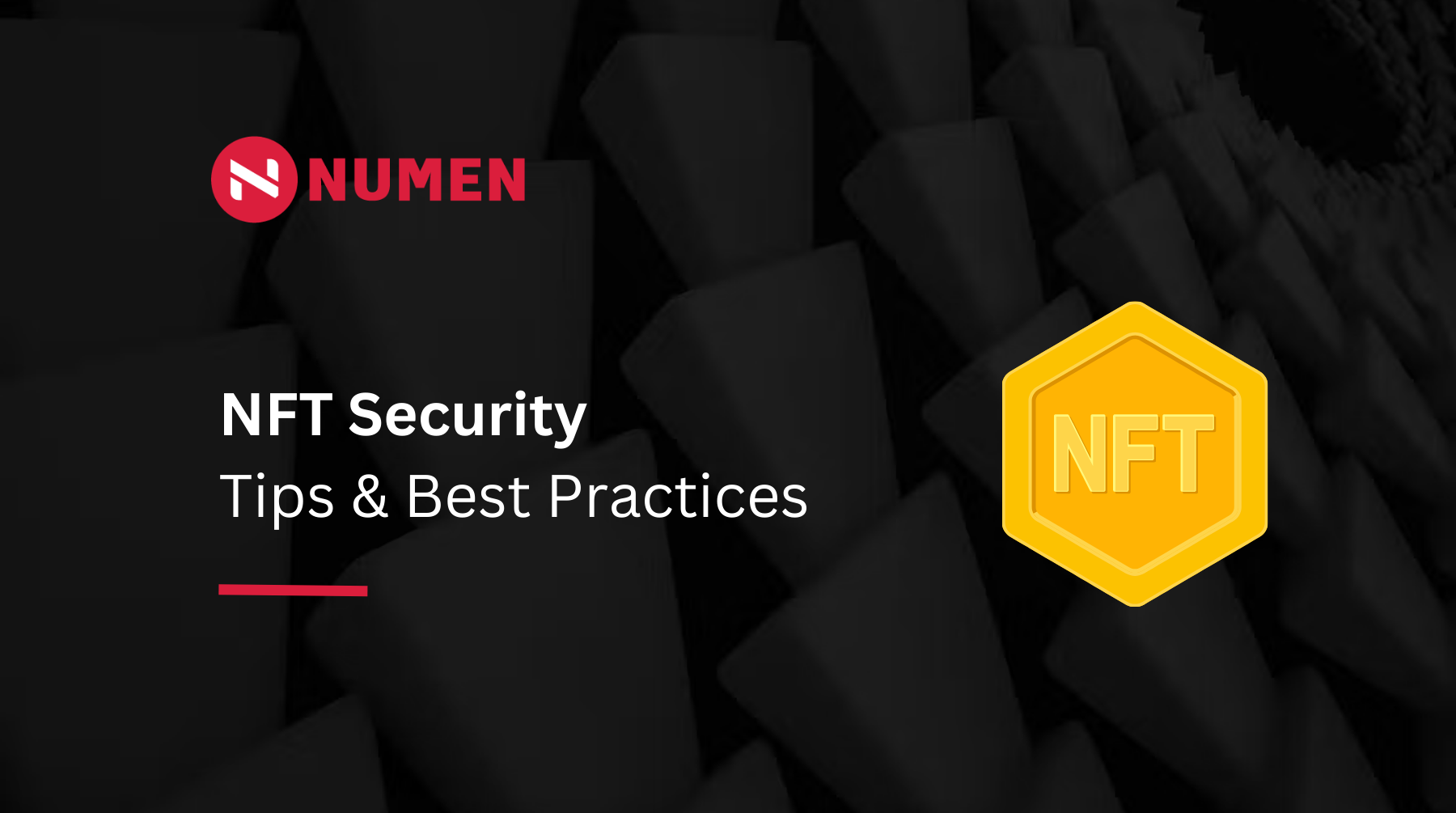
With the skyrocketing popularity of non-fungible tokens (NFTs) in recent years, the digital collectibles market has witnessed unprecedented growth, with NFT sales reaching a staggering $25 billion in 2022 alone. As celebrities like Paris Hilton and Jay-Z jump into the NFT frenzy, it’s clear that this new class of unique digital assets has captivated the attention of both crypto enthusiasts and newcomers alike. However, amidst the excitement and potential financial gains, we must address a pressing concern: NFT security.
As NFTs gain value and prominence, they have also become lucrative targets for hackers, scammers, and malicious agents. Instances of NFT theft, hacks, and fraudulent activities have highlighted the importance of prioritizing the security of these valuable digital assets. Whether you’re a seasoned NFT collector or considering your first foray into the world of NFTs, understanding the best practices for NFT security is paramount to safeguarding your investments and ensuring peace of mind.
In this article, we will delve into the realm of NFT security, providing you with invaluable tips and best practices to fortify the protection of your NFT assets.
Understanding NFT Security
While non-fungible tokens (NFTs) are built on the secure foundation of blockchain technology, it is crucial to acknowledge that NFT security requires careful attention and implementation of robust measures. Although blockchain provides cryptographic security, NFTs can still be vulnerable to various security risks and threats.
NFT security revolves around protecting yourself and your digital assets as you navigate the vast opportunities offered by the Web3 ecosystem. A security-first mindset and adherence to best practices are instrumental in preventing fraud, theft, and unauthorized access to your valuable NFTs. This is especially important considering that once an NFT is lost or stolen, it is often irretrievable.
In the crypto world, where assets hold significant value, hackers and scammers are constantly seeking ways to exploit vulnerabilities. Phishing attacks, where malicious actors attempt to deceive users into providing sensitive information, are a common risk. Users that fall victim inadvertently expose their login credentials and risk losing their valuable NFTs.
Poor wallet management and storage of wallet seed phrases can also pose security threats. Compromised wallets or platforms can result in the loss of your digital assets. Therefore, it is vital to understand and implement the best practices that ensure the security of every aspect of NFT transactions.
Common NFT Security Risks
In the world of NFTs, various security risks pose a threat to the safety and integrity of your valuable digital assets. Some of the most prevalent NFT security risks are explained below:
Fake Marketplaces
One of the easiest ways for beginners to engage with NFTs is through NFT marketplaces. However, fake marketplaces have emerged, mimicking well-known and trusted platforms. These malicious actors aim to deceive users into sharing their sensitive information or stealing their NFTs.
We seriously recommend conducting thorough research and only utilizing trusted and reputable NFT marketplaces and platforms to ensure the authenticity and security of your transactions.
Phishing Attacks
Phishing attacks remain a significant concern in the NFT space, and is one of the more effective methods of NFT thefts. Hackers employ various tactics, such as sending deceptive emails or direct messages that appear legitimate.
These messages often entice users with offers of free NFTs or exclusive collections. By clicking on fraudulent links within these messages, users unknowingly expose their login credentials, seed phrases, and private keys, enabling hackers to gain unauthorized access to their NFT wallets.
Identity Theft
Hackers may impersonate representatives from reputable NFT platforms or marketplaces to deceive users and steal their credentials. They may contact unsuspecting victims through calls or messages, offering enticing opportunities or claiming urgent security concerns. This occurs most notably on places such as Discord.
Falling victim to identity theft can result in compromised wallets and the loss of valuable digital assets. Always verify the authenticity of any communication received and exercise caution when sharing personal information or engaging in transactions.
Rug Pull Scams
Rug pull scams have plagued the NFT market, exploiting the excitement and hype surrounding new NFT collections or giveaways. In these scams, developers or founders lure investors by creating a false sense of security and promising significant returns. Once a substantial amount of money has been accumulated, they disappear, leaving investors with worthless NFTs. Thorough research into NFT projects, including the backgrounds and goals of the creators, is essential to avoid falling victim to rug pull scams.
One example is the Frosties collection Rug Pull scheme. In 2021, the Frosties collection gained significant attention and attracted a large number of investors. The project garnered social media hype and promises of substantial returns. However, after accumulating a substantial amount of money, the developers abruptly disappeared, leaving investors with NFTs that held no real value.
Pump and Dump Schemes
Similar to other crypto markets, NFTs are susceptible to pump and dump schemes. Malicious actors artificially inflate the value of a particular NFT project through coordinated efforts, attracting unsuspecting buyers. Once the price reaches a peak, these actors swiftly sell their NFTs, causing the value to plummet.
Best Practices for NFT Security
To ensure the security and protection of your valuable NFT assets, implementing best practices is crucial. Following these guidelines will significantly reduce the risk of losing your NFTs.
Pay Attention to Each Authorization and Signature
Take the time to carefully review each authorization request and signature prompt before proceeding. Verify that the actions you are about to take align with your intended actions. Scammers and malicious actors can employ techniques to trick users into approving unintended transfers or giving unauthorized access to their NFT assets.
Good wallet classification
While commonly used wallets offer convenience and ease of use, they may not provide the highest level of security required for safeguarding large asset holdings. For substantial NFT investments, it is recommended to opt for a hardware wallet. Hardware wallets are physical devices designed to securely store private keys offline, reducing the risk of online vulnerabilities and unauthorized access.
Use Trusted Crypto Wallets and Marketplaces
Utilize reputable and well-established crypto wallets for storing your NFTs. Hardware wallets, such as Ledger or Trezor, provide an added layer of security by keeping your private keys offline. Additionally, choose trusted NFT marketplaces like OpenSea or Rarible for buying, selling, and trading your NFTs. Thoroughly research the reputation and security features of these platforms before engaging in transactions.
Enable Two-Factor Authentication (2FA)
Implementing 2FA adds an extra layer of security to your NFT wallet and marketplace accounts. Enabling 2FA requires you to have a secondary verification method, such as a unique code generated on your mobile device, in addition to your password. This significantly reduces the risk of unauthorized access even if your password is compromised.
Exercise Caution with Links and Emails
Be wary of clicking on links from unverified sources, especially in emails or direct messages. Phishing attacks often rely on deceptive links that lead to fake websites designed to steal your sensitive information. Always verify the legitimacy of the source before clicking on any links, and never share your wallet seed phrase or private keys with anyone.
Protect Your Seed Phrase
Your wallet’s seed phrase is a crucial component for accessing and recovering your NFTs. Never store your seed phrase digitally or share it online. Instead, write it down on paper or store it in a secure offline location. Keeping your seed phrase offline provides good insurance against hackers gaining access to your wallet and assets.
Regularly Update Software and Firmware
Keep your crypto wallet’s software and firmware up to date. Developers often release security patches and updates to address vulnerabilities and enhance the overall security of the wallet.
Stay Informed and Educated
Stay updated on the latest trends, news, and security practices within the NFT community. Being informed about emerging threats and new security measures empowers you to make informed decisions and adapt your security practices accordingly.
Always Conduct Thorough Research
Before investing in an NFT project or participating in a giveaway, conduct extensive research. Scrutinize the project’s background, team members, roadmap, and community feedback. Verify the authenticity and credibility of the project to minimize the risk of falling victim to scams or rug pulls.
Here are some key aspects to consider during your research:
1. Project Background:
Start by examining the background of the NFT project. Look for information about the team behind the project, their experience in the field, and their track record. Assess their credibility, transparency, and involvement in the community. Projects with clear and trustworthy backgrounds are more likely to provide a secure and reliable investment opportunity.
2. Team Members
Evaluate the credentials and expertise of the team members involved in the NFT project. Research their professional backgrounds, previous projects they have been involved in, and their reputation within the industry.
3. Roadmap and Development Plans
Review the project’s roadmap and development plans. A well-defined roadmap outlines the project’s goals, milestones, and timeline for implementation. Assess whether the roadmap is realistic, achievable, and aligns with the project’s overall vision. Regular updates and progress reports are positive indicators of an active and committed team.
4. Community Engagement
Explore the project’s community engagement. Look for active participation on social media platforms, dedicated forums, and community channels. Engage with the community by asking questions, seeking feedback, and observing discussions. A vibrant and supportive community is indicative of a healthy and transparent project.
5. Independent Reviews and Audits
Seek out independent reviews and audits of the NFT project. Independent auditors such as Numen Cyber can assess the project’s smart contracts, security measures, and overall code quality. Look for any vulnerabilities or red flags highlighted by auditors, as this information can help you make informed decisions.
6. Market Reputation
Consider the market reputation of the NFT project. Analyze the project’s trading volume, price stability, and overall market sentiment. Look for feedback and reviews from other investors or collectors who have participated in the project. A project with a positive market reputation is more likely to provide a secure investment opportunity.
Final Thoughts
By following the best practices outlined in this article, you can significantly reduce the risks associated with NFT security, such as scams, phishing attacks, and rug pulls.
However, navigating the ever-evolving landscape of NFT security can be complex, and it is understandable to seek professional assistance. That’s where Numen Cyber comes in. As experts in cybersecurity, Numen Cyber specializes in NFT security and offers services to help both users and developers protect their NFT assets.
If you encounter any NFT security issues or require a comprehensive audit to ensure the safety of your NFTs, Numen Cyber can provide the expertise and guidance you need. Our team of professionals will assess the security measures of your NFT wallet, marketplace, or project, identifying potential vulnerabilities and recommending robust solutions. Feel free to reach out to us here.
Remember, protecting your NFTs goes beyond just securing your digital wallets and practicing caution. It requires a proactive approach, continuous education, and leveraging the expertise of professionals in the field.


